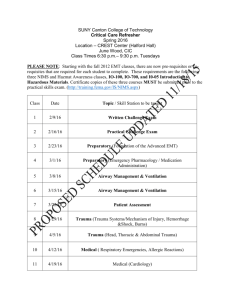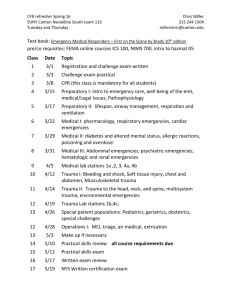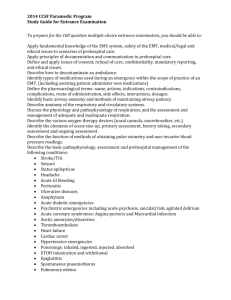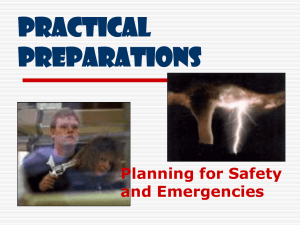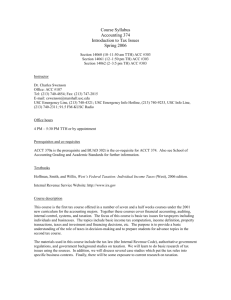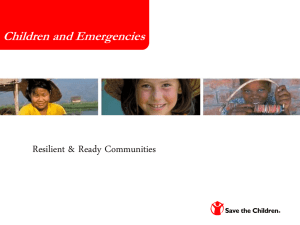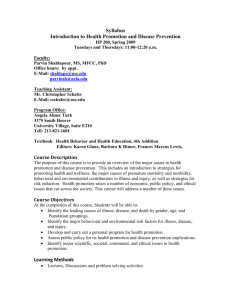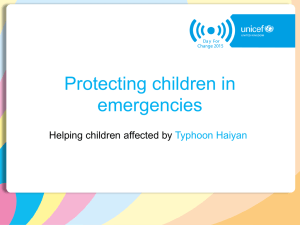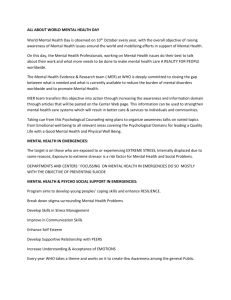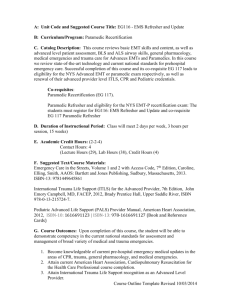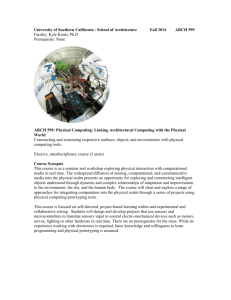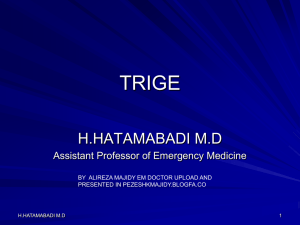Introduction to Emergency Medicine
advertisement
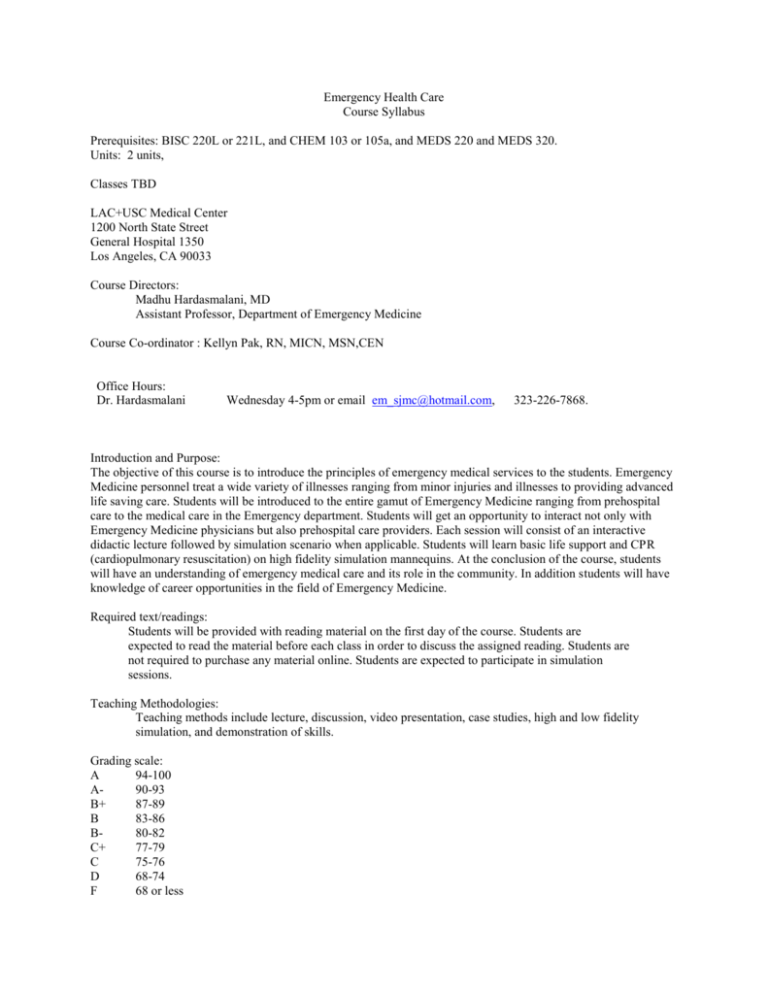
Emergency Health Care Course Syllabus Prerequisites: BISC 220L or 221L, and CHEM 103 or 105a, and MEDS 220 and MEDS 320. Units: 2 units, Classes TBD LAC+USC Medical Center 1200 North State Street General Hospital 1350 Los Angeles, CA 90033 Course Directors: Madhu Hardasmalani, MD Assistant Professor, Department of Emergency Medicine Course Co-ordinator : Kellyn Pak, RN, MICN, MSN,CEN Office Hours: Dr. Hardasmalani Wednesday 4-5pm or email em_sjmc@hotmail.com, 323-226-7868. Introduction and Purpose: The objective of this course is to introduce the principles of emergency medical services to the students. Emergency Medicine personnel treat a wide variety of illnesses ranging from minor injuries and illnesses to providing advanced life saving care. Students will be introduced to the entire gamut of Emergency Medicine ranging from prehospital care to the medical care in the Emergency department. Students will get an opportunity to interact not only with Emergency Medicine physicians but also prehospital care providers. Each session will consist of an interactive didactic lecture followed by simulation scenario when applicable. Students will learn basic life support and CPR (cardiopulmonary resuscitation) on high fidelity simulation mannequins. At the conclusion of the course, students will have an understanding of emergency medical care and its role in the community. In addition students will have knowledge of career opportunities in the field of Emergency Medicine. Required text/readings: Students will be provided with reading material on the first day of the course. Students are expected to read the material before each class in order to discuss the assigned reading. Students are not required to purchase any material online. Students are expected to participate in simulation sessions. Teaching Methodologies: Teaching methods include lecture, discussion, video presentation, case studies, high and low fidelity simulation, and demonstration of skills. Grading scale: A 94-100 A90-93 B+ 87-89 B 83-86 B80-82 C+ 77-79 C 75-76 D 68-74 F 68 or less Grading Breakdown: Class participation: 10% Midterm presentation: 45%. Final Exam: 45%. Attendance Policy: Attendance is mandatory. An excused absence may be obtained for illness, personal emergencies or religious holidays by calling the course director before the date of the absence. An unexcused absence will be reflected in the overall course grade. For those who cannot attend the final exam/presentation must notify the instructor before the class and must schedule a make-up exam/presentation within 1 week. Those who do not call or reschedule will receive zero credit. Midterm Presentation requirements: Students will sign up on the first day of class for a research topic related to Emergency Medicine and present evidence-based literature in groups of 4. All students are required to present their own original work in a creative manner within a maximum 20 minute time frame. Presentations must include literature references. Students are encouraged to use the campus libraries and the internet (e.g. PubMed, OVID) to find appropriate background information and references. The references used should published from primary journal articles from the biomedical literature, rather than books, textbooks, unpublished opinions from the internet (e.g. NO Wikipedia), or popular magazines. Grading criteria for the midterm presentation are as follows: Presentation delivery/creativity: 30%. Content: 45% Evidence-based literature utilized appropriately: 25% Final Exam format: The final exam consists of a 40-question multiple choice exam. Exam questions are related to the information provided in the presentations and handouts of each class session. The exam will start promptly at the beginning of the class for duration of 60 minutes. Late arrivals will be permitted to take the exam, but all exam papers will be collected 60 minutes from the beginning of class. Regarding absences on the day of the final exam refer to the Attendance Policy section. Grading scale for the final exam will be based on the correct responses to the multiple choice questions. Grade: Correct responses A 38-40. A35-37. B+ 32-34. B29-31. C+ 26-28. C 24-25. D 21-23. F 20/less. Course Schedule: Lecture Week 1 History of Emergency Medicine and “The C-booth”: What is Emergency Medicine? Pre-reading assignment As assigned What are the components of Emergency Medical Services? Discuss the hustle-bustle of central resuscitation area at Los Angeles County hospital. Week 2 Pre-hospital Emergency Medical Services: Discuss the role and responsibility of prehospital emergency personnel. Discuss different tiers of prehospital services. CPR, BLS Week 3 Week 4 Week 5 Week 6 Week 7 Week 8 Week 9 Week 10 Week 11 Week 12 Week 13 Disaster Medicine: What is Disaster Medicine? Discuss health care to disaster survivors. Discuss disaster planning, response and recovery. Drugs and Toxins: Discuss common poisonings. Discuss latest designer drugs and abuse. Pediatric Emergencies: Discuss anatomic and physiologic differences between adults and children. Discuss common newborn and childhood illnesses Financial aspects of Emergency Medicine: Discuss economic costs of emergency departments and its financial contribution to the hospital. Emergency Trauma care: What constitutes trauma center? Operations of trauma center. Introduction to management of blunt and penetrating trauma. Midterm Presentations Wilderness Medicine: Discuss common environmental emergencies, Discuss first aid and secondary care to victims of wilderness pathology. Sports Emergencies: Introduction to emergency care in different sports. Discuss common issues like concussion, orthopedic injuries. Briefly discuss cardiac issues in sporting activities. Ultrasound in Emergency Medicine: Use of ultrasound as an effective diagnostic tool. Discuss focus assessment with sonography in trauma. Geriatric Emergencies: Discuss unique aspects of geriatric medicine. Discuss social and psychosocial issues in geriatric emergencies. Forensics in Emergency Medicine: As assigned As assigned As assigned As assigned As assigned As assigned As assigned As assigned As assigned As assigned Importance of forensic investigation in suspected abuse and homicidal cases. Briefly discuss intimate partner violence. Week 14 Psychiatric Emergencies: Discuss clinical As assigned aspects of psychiatry in emergency medicine. Discuss management of common psychiatric emergencies. Week 15 Final Exam Careers in Emergency Medicine /Review: Panel discussion of various branches of emergency medicine and career options. Statement for Students with Disabilities Any student requesting academic accommodations based on a disability is required to register with Disability Services and Programs (DSP) each semester. A letter of verification for approved accommodations can be obtained from DSP. Please be sure the letter is delivered to me (or to TA) as early in the semester as possible. DSP is located in STU 301 and is open 8:30 a.m.–5:00 p.m., Monday through Friday. The phone number for DSP is (213) 7400776. Statement on Academic Integrity USC seeks to maintain an optimal learning environment. General principles of academic honesty include the concept of respect for the intellectual property of others, the expectation that individual work will be submitted unless otherwise allowed by an instructor, and the obligations both to protect one’s own academic work from misuse by others as well as to avoid using another’s work as one’s own. All students are expected to understand and abide by these principles. Scampus, the Student Guidebook, contains the Student Conduct Code in Section 11.00, while the recommended sanctions are located in Appendix A: http://www.usc.edu/dept/publications/SCAMPUS/gov/. Students will be referred to the Office of Student Judicial Affairs and Community Standards for further review, should there be any suspicion of academic dishonesty. The Review process can be found at: http://www.usc.edu/student-affairs/SJACS/.. Emergency Preparedness/Course Continuity: In case of emergency, and travel to campus is difficult, USC executive leadership will announce an electronic way for instructors to teach students in their residence halls or homes using a combination of Blackboard, teleconferencing, and other technologies. Instructors should be prepared to assign students a "Plan B" project that can be completed at a distance. For additional information about maintaining your classes in an emergency please access: http://cst.usc.edu/services/emergencyprep.html
